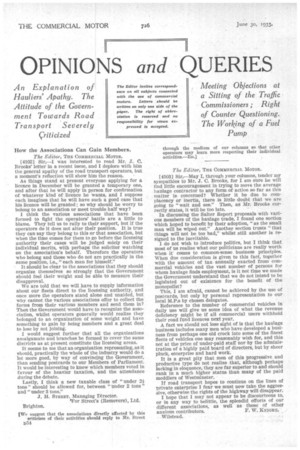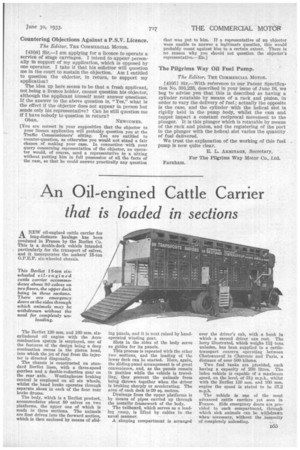OPINIONS and QUERIES
Page 104

Page 105

If you've noticed an error in this article please click here to report it so we can fix it.
An Explanation of Hauliers' Apathy. The Attitude of the Government Towards Road Transport Severely Criticized Meeting Objections at a Sitting of the Traffic Commissioners ; Right of Counter Questioning. The Working of a Fuel Pump
How the Associations Can Gain Members.
The Editor, THE COMMERCIAL MOTOR.
[4102] Sir,—I was interested to read Mr. J. C. Brooks' letter in a recent issue, and I deplore with him the general apathy of the road transport operators, but a moment's reflection will show him the reason. • As things stand at present everyone applying for a licence in December will be granted a temporary one, and after that he will apply in person for confirmation of whatever kind of licence he wants, and I suppose each imagines that he will have such a good case that his licence will be granted ; so why should he worry to belong to an association or meet trouble half way?
I think the various associations that have been formed to fight the operators' battle are a little to blame. They tell us to rally to their support, but if the operators do it does not alter their position. It is true they can say they belong to this or that association, but when the time comes for them to go before the licensing authority their cases will be judged solely on their individual merits, with perhaps the solicitor watching on the association's behalf. Therefore the operators who belong and those who do not are practically in the same position, i.e., "each man for himself."
It should be clear to the associations that they should organize themselves so strongly that the Government should feel their weight and be able to measure their disapproval.
We are told that we will have to supply information about our fleets direct to the licensing authority, and once more the operators stand alone and unaided, but why cannot the various associations offer to collect the forms from their various members and send them in? Then the Government would have to recognize the association, whilst operators generally would realize they belonged to an organization of some weight and have something to gain by being members and a great deal to lose by not joining.
I would suggest further that all the organizations amalgamate and branches be formed to cover the same districts as at present constitute the licensing areas.
It seems to me that an organization representing, as it should, practically the whole of the industry would do a lot more good, by way of convincing the Government, than sending postcards to our Members of Parliament. It would be interesting to know which members voted in favour of the heavier taxation, and the attendance during the debate.
Lastly, I think a new taxable class of "under 21, tons" should be allowed for, between "under 2 tons" and "under 3 tons."
J. H. STREET. Managing Director.
'For Street's (Removers), Ltd. Brighton.
[We suggest that the associations directly affected by this criticism of their activities should reply to *Mr. Street D54 through the medium of our columns so that other operators may learn more respecting their individual activities—En.]
The Editor, TRE COMMERCIAL IVIOTOR.
[4103] Sir,—May I, through your columns, tender my sympathies to Mr. J. C. Brooks, for I am sure he will lind little encouragement in trying to move the average haulage contractor to any form of action so far as this matter is concerned? Whether it be due to complacency or inertia, there is little doubt that we are going to "wait and see." Then, as Mr. Brooks correctly states, it will be too late.
In discussing the Salter Report proposals with various members of the haulage trade, I found one section which hoped to benefit by their adoption, "as the small man will be wiped out." Another section trusts "that things will not be too bad," whilst still another is resigned to the inevitable.
I do not wish to introduce politics, but I think that most of us realize what our politicians are really worth when it comes to common-sense business principles. When due consideration is given to this fact, together with the amount of tax annually exacted from commercial vehicles and the vast number of persons for whom haulage finds employment, is it not time we made the Government understand that we do not intend to be legislated out of existence for the benefit of the monopolist?
This, I am afraid, cannot be achieved by the use of postcards, but only by personal representation to our local M.P.s by chosen delegates.
Reference to the number of commercial vehicles in daily use will give us some idea of what the revenue deficiency might be if all commercial users withhold their road fund licences next year.
A fact we should not lose sight of is that the haulage business includes many men who have developed a business from perhaps one old crock into some of the finest fleets of vehicles one may reasonably wish for, and this not at the price of under-paid staff nor by the adminis. tration of a highly paid board of directors, but by sheer pluck, enterprise and hard work.
It is a great pity that men of this progressive and productive type do not realize that, although perhaps lacking in eloquence, they are far superior to and should rank in a much higher status than many of the paid meddlers of Westminster.
If road transport hopes to continue on the lines of private enterprise I fear we must now take the aggressive, otherwise the rights of the highway will disappear. I hope that I may not appear to be discourteous to, or in any way to belittle, the splendid efforts of our different associations, as well as those of other anxious contributors. F. W. KSIGTIT. Wilstead.
Countering Objections Against a P.S.V. Licence.
The Editor, THE COMMERCIAL MOTOR.
[4104] Sir,—I am applying for a licence to operate a service of stage carriages. I intend to appear personally in support of my application, which is opposed by one operator. I take it that his solicitor will question me in the court to sustain the objection. Am I entitled to question the objector, in return, to support my application?
The idea up here seems to be that a fresh applicant, not being a licence holder, cannot question his objector, although the applicant himself must answer questions. If the answer to the above question is, "Yes," what is the effect if the objector does not appear in person but sends only his representative? Can he still question me if I have nobody to question in return?
Oban. NEWCOMER.
[You are correct in your supposition that the objector to your licence application will probably question you at the Traffic Commissioners' sitting. You are entitled to counter-question, as otherwise you would not stand a fair chance of making your case. In connection with your query concerning representation of the objector, no operator would, of course, send a representative to a sitting without putting him in full possession of all the facts of the case, so that he could answer practically any question that was put to him. If a representative of an objector were unable to answer a legitimate question, this would probably count against him to a certain extent. There is no reason why you should not question the objector's representative.—ED.]
The Pilgrims Way Oil Fuel Pump.
The Editor, THE COMMERCIAL MOTOR.
[4105] Sir,—With reference to our Patent Specification No. 391,233, described in your issue of June 16, we beg to advise you that this is described as having a cylinder rotatable by means of a rack and pinion, in order to vary the delivery of fuel; actually the opposite is the case, and the cylinder with the helical slot is rigidly held in the pump body, whilst the earn and tappet impart a constant reciprocal movement to the plunger.' It is this plunger which is rotatable by means of the rack and pinion, and the registering of the port in the plunger with the helical slot varies the quantity of fuel delivered.
We trust the explanation of the working of this fuel pump is now quite clear.
E. L. ARMITAGE, Secretary,
For The Pilgrims Way Motor Co., Ltd.
Farnham.




















































































































































